WACC100 Accounting in Society: Facebook Data Privacy Scandal Analysis
VerifiedAdded on 2023/04/21
|6
|1328
|190
Case Study
AI Summary
This case study delves into the Facebook Data Privacy Scandal, highlighting the ethical implications of misusing user data. It examines how Cambridge Analytica exploited the personal information of over 50 million Facebook users, impacting the 2016 US presidential election. The study provides a company overview of Facebook, details the ethical issues surrounding data privacy, and analyzes the impact on stakeholders and Facebook's business operations. It reflects on the importance of business ethics, corporate responsibility, and adherence to legal rules and regulations. The case concludes that the scandal was an unethical act that eroded user confidence, prompting Facebook to enhance its security framework. Desklib provides a platform for students to access similar case studies and solved assignments for academic assistance.
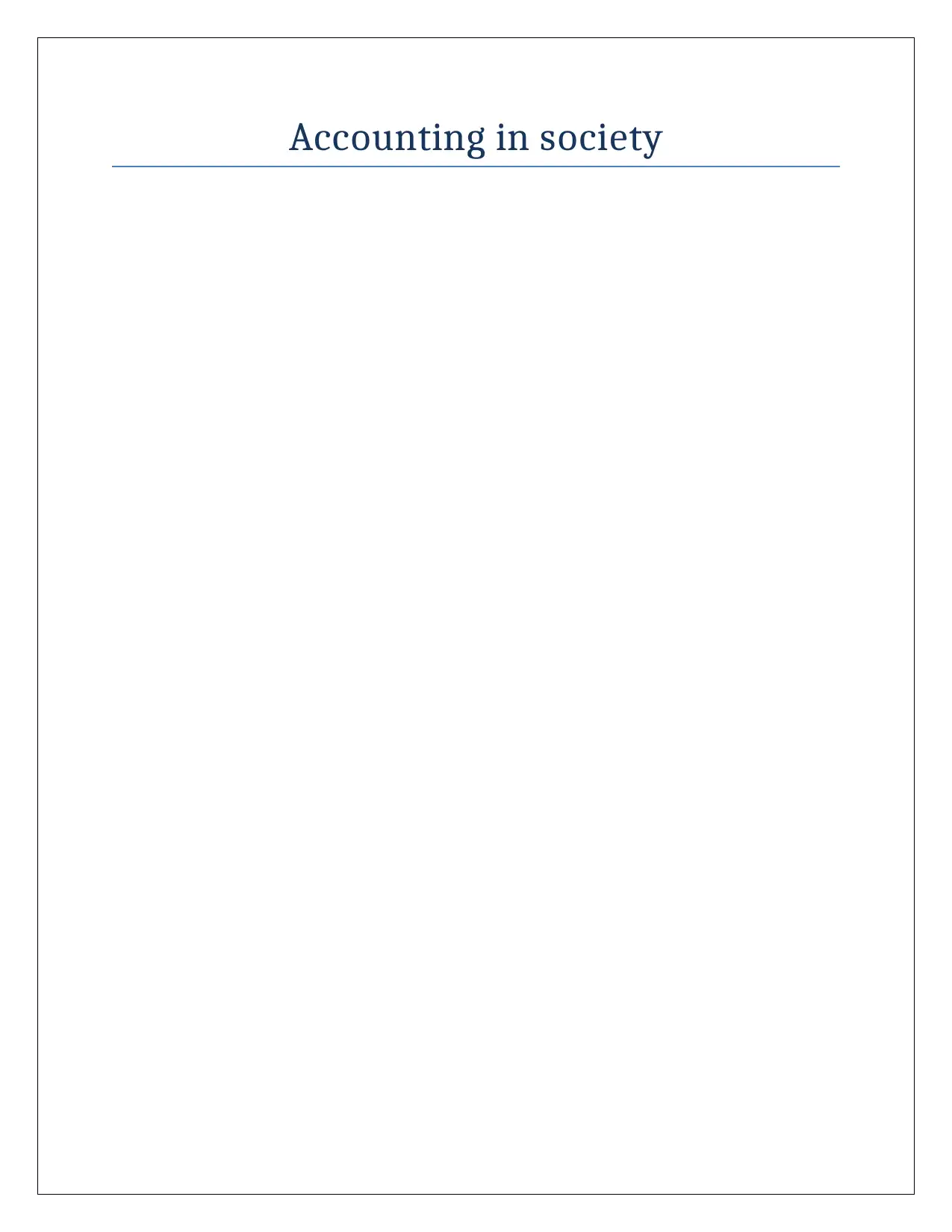
Accounting in society
Paraphrase This Document
Need a fresh take? Get an instant paraphrase of this document with our AI Paraphraser
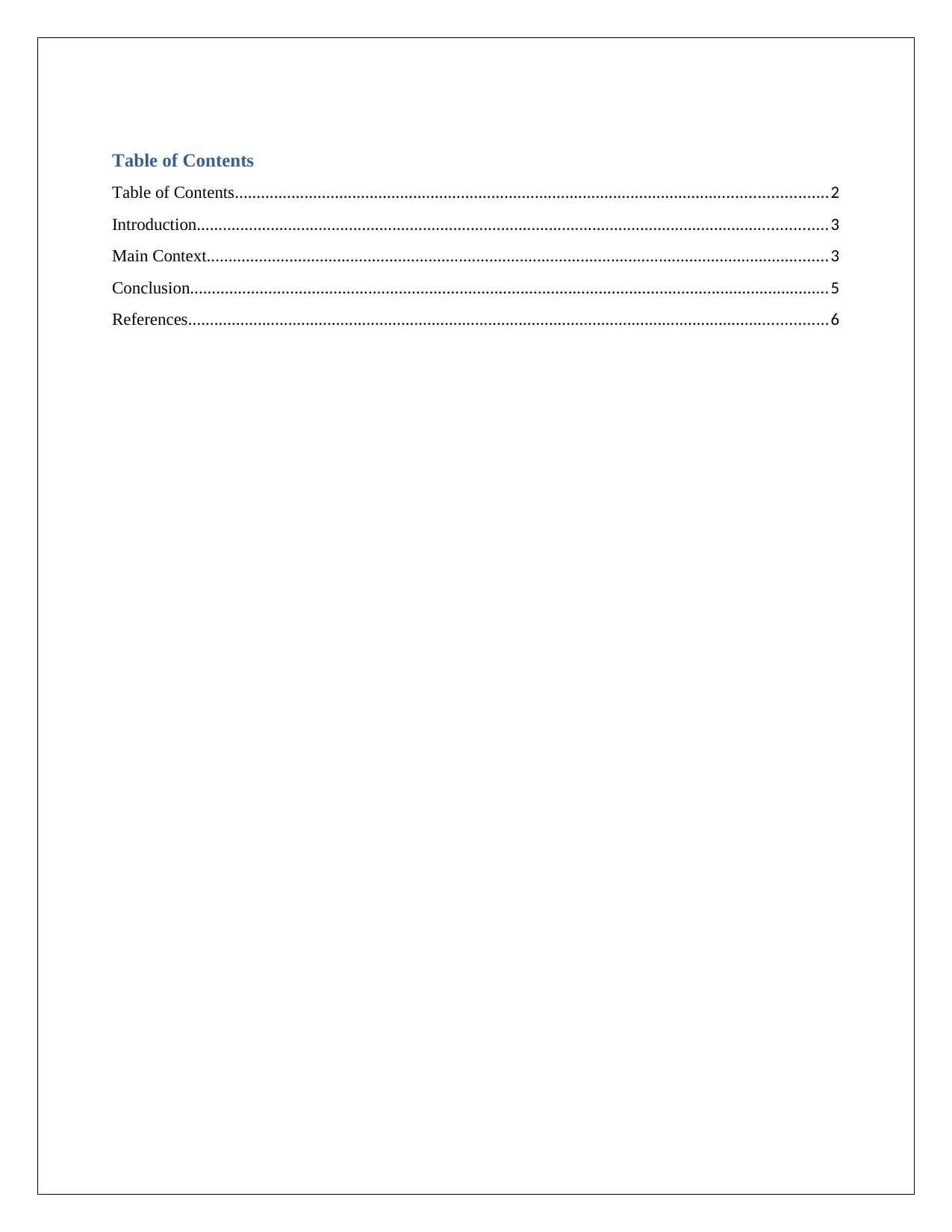
Table of Contents
Table of Contents........................................................................................................................................2
Introduction.................................................................................................................................................3
Main Context...............................................................................................................................................3
Conclusion...................................................................................................................................................5
References...................................................................................................................................................6
Table of Contents........................................................................................................................................2
Introduction.................................................................................................................................................3
Main Context...............................................................................................................................................3
Conclusion...................................................................................................................................................5
References...................................................................................................................................................6
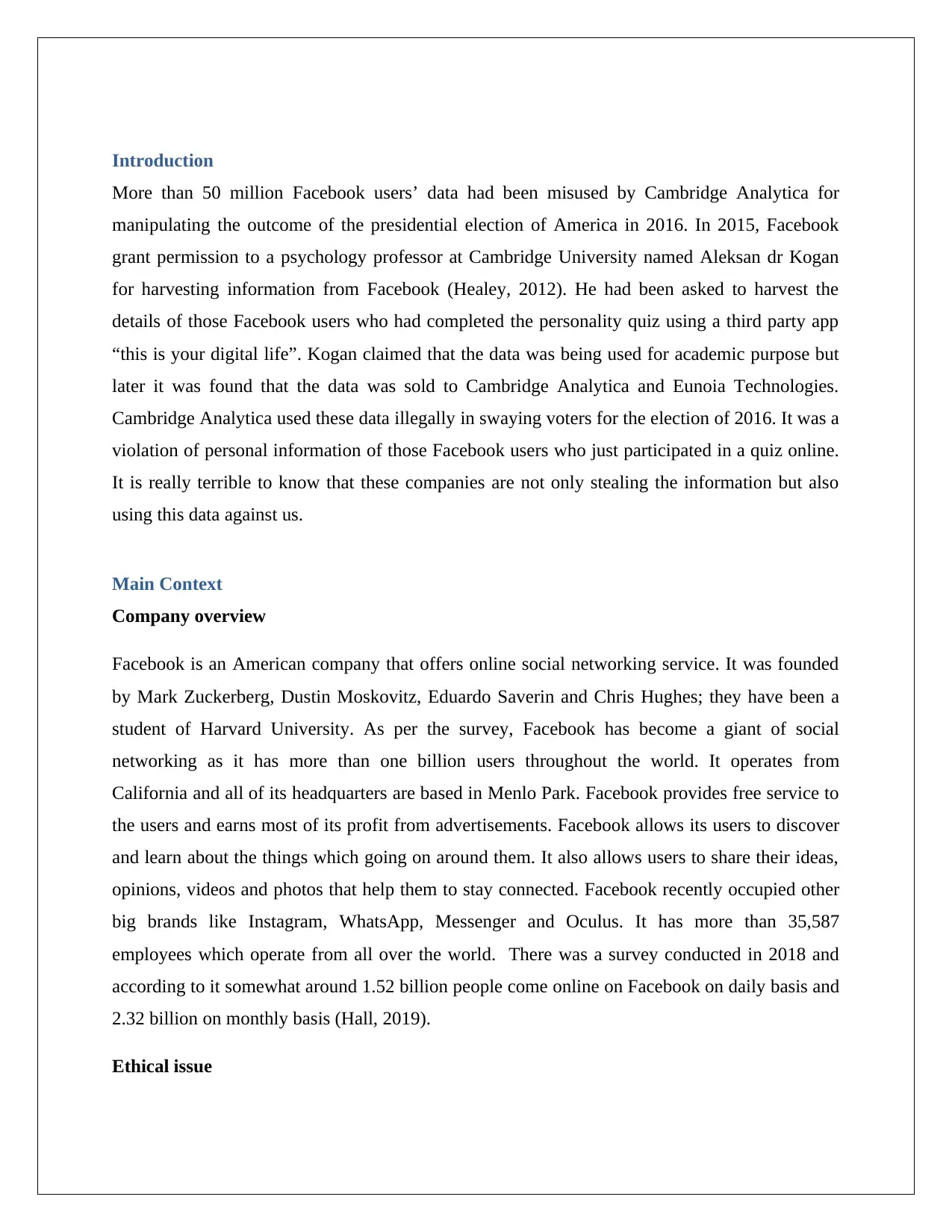
Introduction
More than 50 million Facebook users’ data had been misused by Cambridge Analytica for
manipulating the outcome of the presidential election of America in 2016. In 2015, Facebook
grant permission to a psychology professor at Cambridge University named Aleksan dr Kogan
for harvesting information from Facebook (Healey, 2012). He had been asked to harvest the
details of those Facebook users who had completed the personality quiz using a third party app
“this is your digital life”. Kogan claimed that the data was being used for academic purpose but
later it was found that the data was sold to Cambridge Analytica and Eunoia Technologies.
Cambridge Analytica used these data illegally in swaying voters for the election of 2016. It was a
violation of personal information of those Facebook users who just participated in a quiz online.
It is really terrible to know that these companies are not only stealing the information but also
using this data against us.
Main Context
Company overview
Facebook is an American company that offers online social networking service. It was founded
by Mark Zuckerberg, Dustin Moskovitz, Eduardo Saverin and Chris Hughes; they have been a
student of Harvard University. As per the survey, Facebook has become a giant of social
networking as it has more than one billion users throughout the world. It operates from
California and all of its headquarters are based in Menlo Park. Facebook provides free service to
the users and earns most of its profit from advertisements. Facebook allows its users to discover
and learn about the things which going on around them. It also allows users to share their ideas,
opinions, videos and photos that help them to stay connected. Facebook recently occupied other
big brands like Instagram, WhatsApp, Messenger and Oculus. It has more than 35,587
employees which operate from all over the world. There was a survey conducted in 2018 and
according to it somewhat around 1.52 billion people come online on Facebook on daily basis and
2.32 billion on monthly basis (Hall, 2019).
Ethical issue
More than 50 million Facebook users’ data had been misused by Cambridge Analytica for
manipulating the outcome of the presidential election of America in 2016. In 2015, Facebook
grant permission to a psychology professor at Cambridge University named Aleksan dr Kogan
for harvesting information from Facebook (Healey, 2012). He had been asked to harvest the
details of those Facebook users who had completed the personality quiz using a third party app
“this is your digital life”. Kogan claimed that the data was being used for academic purpose but
later it was found that the data was sold to Cambridge Analytica and Eunoia Technologies.
Cambridge Analytica used these data illegally in swaying voters for the election of 2016. It was a
violation of personal information of those Facebook users who just participated in a quiz online.
It is really terrible to know that these companies are not only stealing the information but also
using this data against us.
Main Context
Company overview
Facebook is an American company that offers online social networking service. It was founded
by Mark Zuckerberg, Dustin Moskovitz, Eduardo Saverin and Chris Hughes; they have been a
student of Harvard University. As per the survey, Facebook has become a giant of social
networking as it has more than one billion users throughout the world. It operates from
California and all of its headquarters are based in Menlo Park. Facebook provides free service to
the users and earns most of its profit from advertisements. Facebook allows its users to discover
and learn about the things which going on around them. It also allows users to share their ideas,
opinions, videos and photos that help them to stay connected. Facebook recently occupied other
big brands like Instagram, WhatsApp, Messenger and Oculus. It has more than 35,587
employees which operate from all over the world. There was a survey conducted in 2018 and
according to it somewhat around 1.52 billion people come online on Facebook on daily basis and
2.32 billion on monthly basis (Hall, 2019).
Ethical issue
⊘ This is a preview!⊘
Do you want full access?
Subscribe today to unlock all pages.

Trusted by 1+ million students worldwide
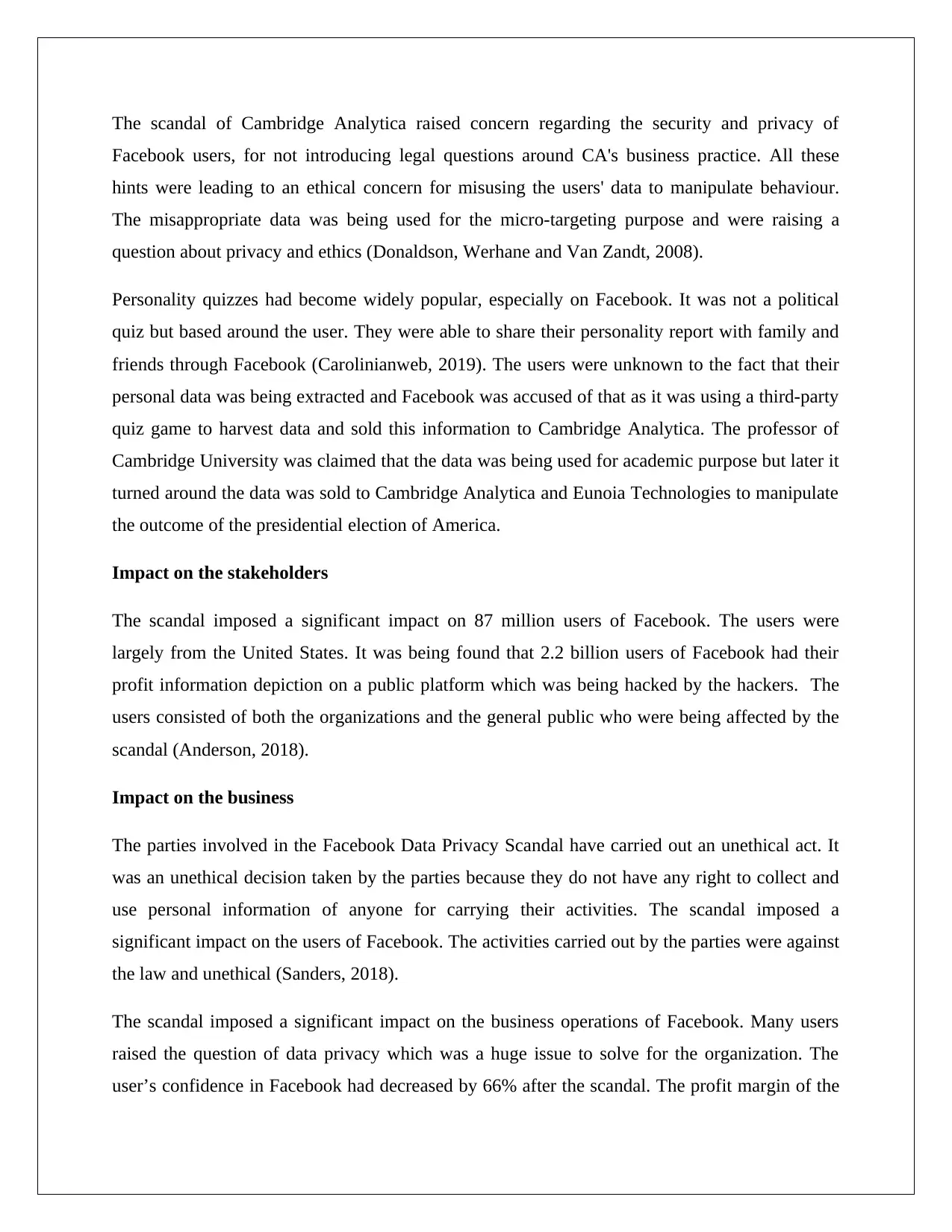
The scandal of Cambridge Analytica raised concern regarding the security and privacy of
Facebook users, for not introducing legal questions around CA's business practice. All these
hints were leading to an ethical concern for misusing the users' data to manipulate behaviour.
The misappropriate data was being used for the micro-targeting purpose and were raising a
question about privacy and ethics (Donaldson, Werhane and Van Zandt, 2008).
Personality quizzes had become widely popular, especially on Facebook. It was not a political
quiz but based around the user. They were able to share their personality report with family and
friends through Facebook (Carolinianweb, 2019). The users were unknown to the fact that their
personal data was being extracted and Facebook was accused of that as it was using a third-party
quiz game to harvest data and sold this information to Cambridge Analytica. The professor of
Cambridge University was claimed that the data was being used for academic purpose but later it
turned around the data was sold to Cambridge Analytica and Eunoia Technologies to manipulate
the outcome of the presidential election of America.
Impact on the stakeholders
The scandal imposed a significant impact on 87 million users of Facebook. The users were
largely from the United States. It was being found that 2.2 billion users of Facebook had their
profit information depiction on a public platform which was being hacked by the hackers. The
users consisted of both the organizations and the general public who were being affected by the
scandal (Anderson, 2018).
Impact on the business
The parties involved in the Facebook Data Privacy Scandal have carried out an unethical act. It
was an unethical decision taken by the parties because they do not have any right to collect and
use personal information of anyone for carrying their activities. The scandal imposed a
significant impact on the users of Facebook. The activities carried out by the parties were against
the law and unethical (Sanders, 2018).
The scandal imposed a significant impact on the business operations of Facebook. Many users
raised the question of data privacy which was a huge issue to solve for the organization. The
user’s confidence in Facebook had decreased by 66% after the scandal. The profit margin of the
Facebook users, for not introducing legal questions around CA's business practice. All these
hints were leading to an ethical concern for misusing the users' data to manipulate behaviour.
The misappropriate data was being used for the micro-targeting purpose and were raising a
question about privacy and ethics (Donaldson, Werhane and Van Zandt, 2008).
Personality quizzes had become widely popular, especially on Facebook. It was not a political
quiz but based around the user. They were able to share their personality report with family and
friends through Facebook (Carolinianweb, 2019). The users were unknown to the fact that their
personal data was being extracted and Facebook was accused of that as it was using a third-party
quiz game to harvest data and sold this information to Cambridge Analytica. The professor of
Cambridge University was claimed that the data was being used for academic purpose but later it
turned around the data was sold to Cambridge Analytica and Eunoia Technologies to manipulate
the outcome of the presidential election of America.
Impact on the stakeholders
The scandal imposed a significant impact on 87 million users of Facebook. The users were
largely from the United States. It was being found that 2.2 billion users of Facebook had their
profit information depiction on a public platform which was being hacked by the hackers. The
users consisted of both the organizations and the general public who were being affected by the
scandal (Anderson, 2018).
Impact on the business
The parties involved in the Facebook Data Privacy Scandal have carried out an unethical act. It
was an unethical decision taken by the parties because they do not have any right to collect and
use personal information of anyone for carrying their activities. The scandal imposed a
significant impact on the users of Facebook. The activities carried out by the parties were against
the law and unethical (Sanders, 2018).
The scandal imposed a significant impact on the business operations of Facebook. Many users
raised the question of data privacy which was a huge issue to solve for the organization. The
user’s confidence in Facebook had decreased by 66% after the scandal. The profit margin of the
Paraphrase This Document
Need a fresh take? Get an instant paraphrase of this document with our AI Paraphraser
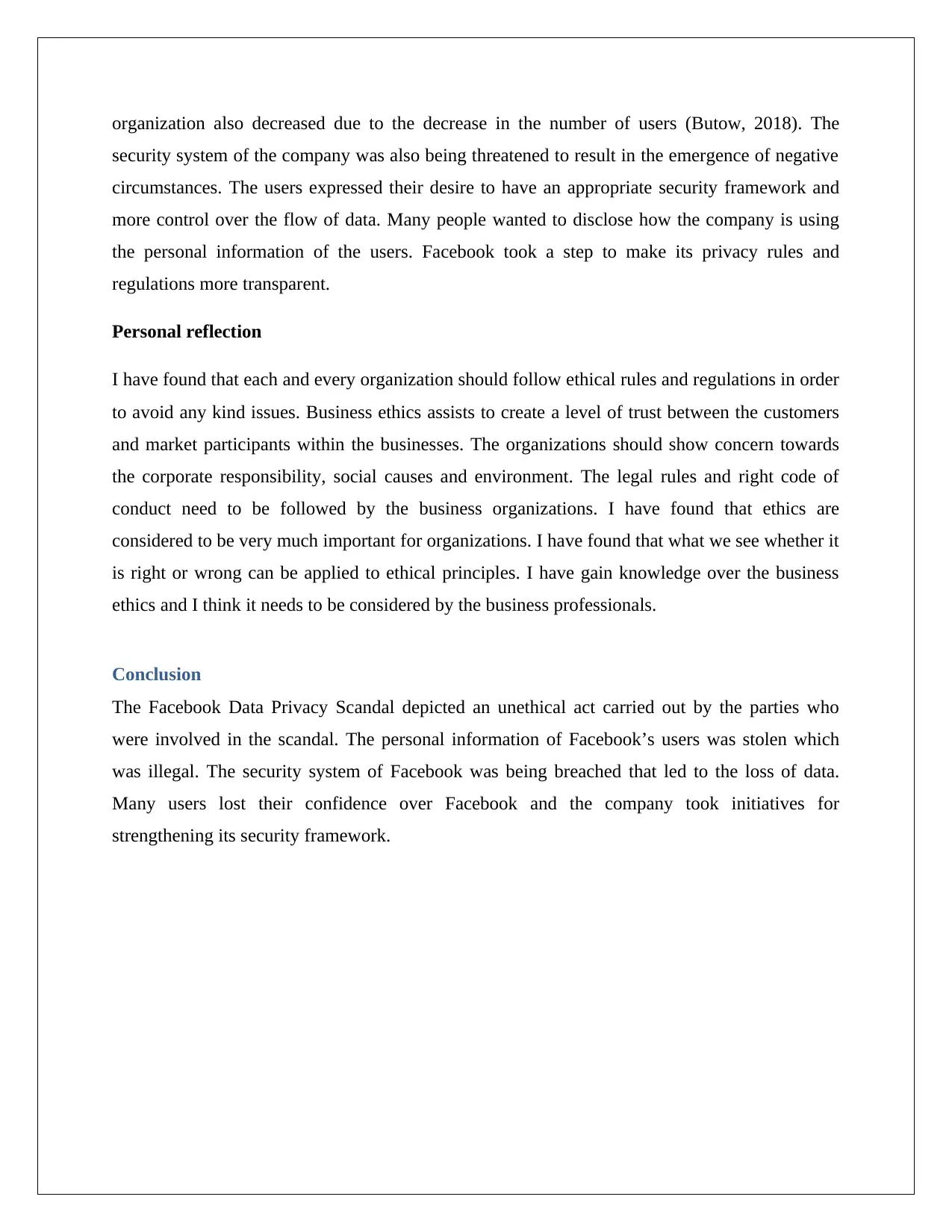
organization also decreased due to the decrease in the number of users (Butow, 2018). The
security system of the company was also being threatened to result in the emergence of negative
circumstances. The users expressed their desire to have an appropriate security framework and
more control over the flow of data. Many people wanted to disclose how the company is using
the personal information of the users. Facebook took a step to make its privacy rules and
regulations more transparent.
Personal reflection
I have found that each and every organization should follow ethical rules and regulations in order
to avoid any kind issues. Business ethics assists to create a level of trust between the customers
and market participants within the businesses. The organizations should show concern towards
the corporate responsibility, social causes and environment. The legal rules and right code of
conduct need to be followed by the business organizations. I have found that ethics are
considered to be very much important for organizations. I have found that what we see whether it
is right or wrong can be applied to ethical principles. I have gain knowledge over the business
ethics and I think it needs to be considered by the business professionals.
Conclusion
The Facebook Data Privacy Scandal depicted an unethical act carried out by the parties who
were involved in the scandal. The personal information of Facebook’s users was stolen which
was illegal. The security system of Facebook was being breached that led to the loss of data.
Many users lost their confidence over Facebook and the company took initiatives for
strengthening its security framework.
security system of the company was also being threatened to result in the emergence of negative
circumstances. The users expressed their desire to have an appropriate security framework and
more control over the flow of data. Many people wanted to disclose how the company is using
the personal information of the users. Facebook took a step to make its privacy rules and
regulations more transparent.
Personal reflection
I have found that each and every organization should follow ethical rules and regulations in order
to avoid any kind issues. Business ethics assists to create a level of trust between the customers
and market participants within the businesses. The organizations should show concern towards
the corporate responsibility, social causes and environment. The legal rules and right code of
conduct need to be followed by the business organizations. I have found that ethics are
considered to be very much important for organizations. I have found that what we see whether it
is right or wrong can be applied to ethical principles. I have gain knowledge over the business
ethics and I think it needs to be considered by the business professionals.
Conclusion
The Facebook Data Privacy Scandal depicted an unethical act carried out by the parties who
were involved in the scandal. The personal information of Facebook’s users was stolen which
was illegal. The security system of Facebook was being breached that led to the loss of data.
Many users lost their confidence over Facebook and the company took initiatives for
strengthening its security framework.
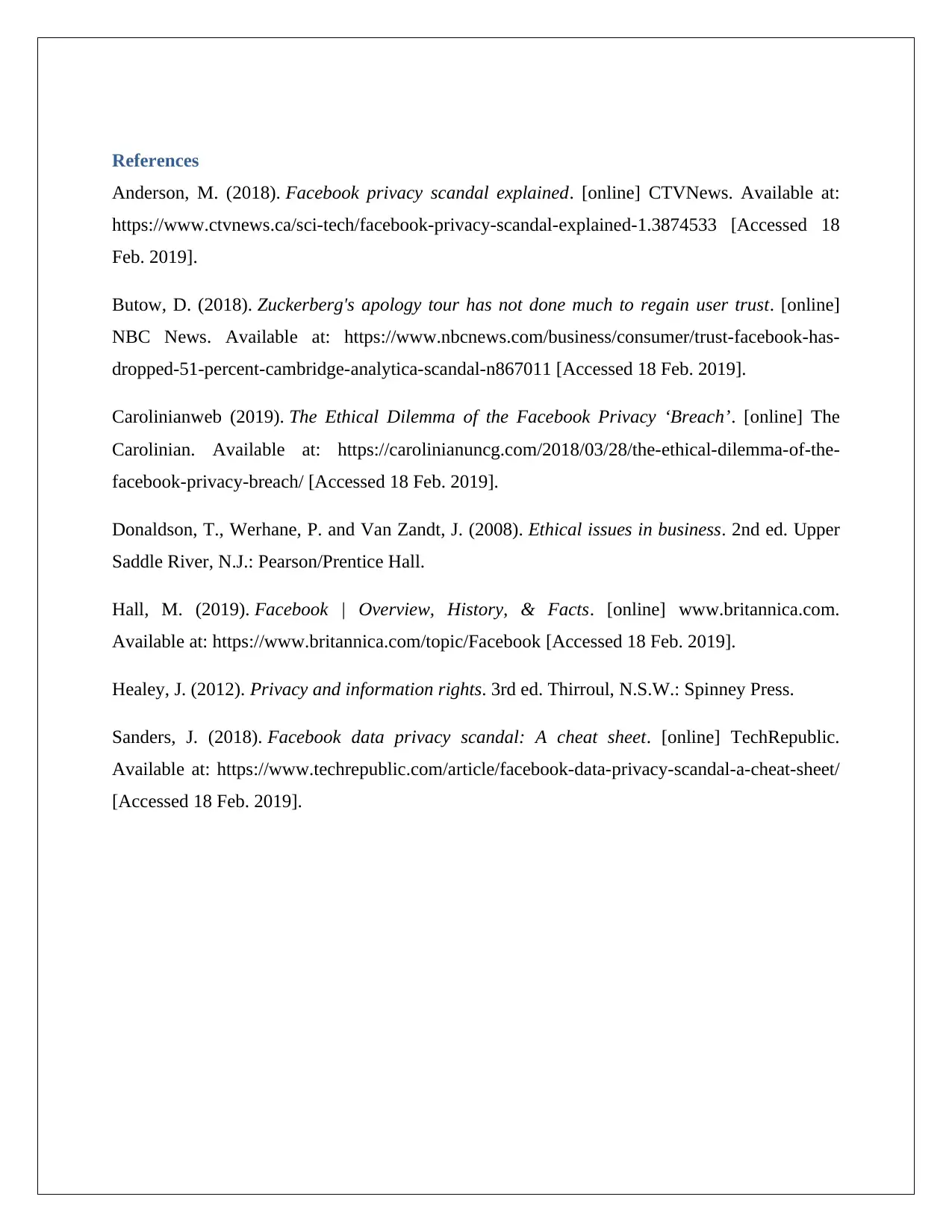
References
Anderson, M. (2018). Facebook privacy scandal explained. [online] CTVNews. Available at:
https://www.ctvnews.ca/sci-tech/facebook-privacy-scandal-explained-1.3874533 [Accessed 18
Feb. 2019].
Butow, D. (2018). Zuckerberg's apology tour has not done much to regain user trust. [online]
NBC News. Available at: https://www.nbcnews.com/business/consumer/trust-facebook-has-
dropped-51-percent-cambridge-analytica-scandal-n867011 [Accessed 18 Feb. 2019].
Carolinianweb (2019). The Ethical Dilemma of the Facebook Privacy ‘Breach’. [online] The
Carolinian. Available at: https://carolinianuncg.com/2018/03/28/the-ethical-dilemma-of-the-
facebook-privacy-breach/ [Accessed 18 Feb. 2019].
Donaldson, T., Werhane, P. and Van Zandt, J. (2008). Ethical issues in business. 2nd ed. Upper
Saddle River, N.J.: Pearson/Prentice Hall.
Hall, M. (2019). Facebook | Overview, History, & Facts. [online] www.britannica.com.
Available at: https://www.britannica.com/topic/Facebook [Accessed 18 Feb. 2019].
Healey, J. (2012). Privacy and information rights. 3rd ed. Thirroul, N.S.W.: Spinney Press.
Sanders, J. (2018). Facebook data privacy scandal: A cheat sheet. [online] TechRepublic.
Available at: https://www.techrepublic.com/article/facebook-data-privacy-scandal-a-cheat-sheet/
[Accessed 18 Feb. 2019].
Anderson, M. (2018). Facebook privacy scandal explained. [online] CTVNews. Available at:
https://www.ctvnews.ca/sci-tech/facebook-privacy-scandal-explained-1.3874533 [Accessed 18
Feb. 2019].
Butow, D. (2018). Zuckerberg's apology tour has not done much to regain user trust. [online]
NBC News. Available at: https://www.nbcnews.com/business/consumer/trust-facebook-has-
dropped-51-percent-cambridge-analytica-scandal-n867011 [Accessed 18 Feb. 2019].
Carolinianweb (2019). The Ethical Dilemma of the Facebook Privacy ‘Breach’. [online] The
Carolinian. Available at: https://carolinianuncg.com/2018/03/28/the-ethical-dilemma-of-the-
facebook-privacy-breach/ [Accessed 18 Feb. 2019].
Donaldson, T., Werhane, P. and Van Zandt, J. (2008). Ethical issues in business. 2nd ed. Upper
Saddle River, N.J.: Pearson/Prentice Hall.
Hall, M. (2019). Facebook | Overview, History, & Facts. [online] www.britannica.com.
Available at: https://www.britannica.com/topic/Facebook [Accessed 18 Feb. 2019].
Healey, J. (2012). Privacy and information rights. 3rd ed. Thirroul, N.S.W.: Spinney Press.
Sanders, J. (2018). Facebook data privacy scandal: A cheat sheet. [online] TechRepublic.
Available at: https://www.techrepublic.com/article/facebook-data-privacy-scandal-a-cheat-sheet/
[Accessed 18 Feb. 2019].
⊘ This is a preview!⊘
Do you want full access?
Subscribe today to unlock all pages.

Trusted by 1+ million students worldwide
1 out of 6
Related Documents
Your All-in-One AI-Powered Toolkit for Academic Success.
+13062052269
info@desklib.com
Available 24*7 on WhatsApp / Email
![[object Object]](/_next/static/media/star-bottom.7253800d.svg)
Unlock your academic potential
Copyright © 2020–2026 A2Z Services. All Rights Reserved. Developed and managed by ZUCOL.





